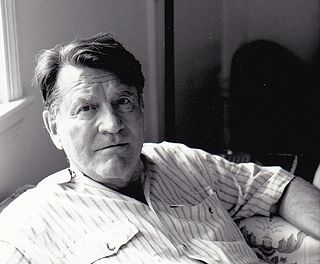Related Research Articles
Psychotherapy is the use of psychological methods, particularly when based on regular personal interaction, to help a person change behavior, increase happiness, and overcome problems. Psychotherapy aims to improve an individual's well-being and mental health, to resolve or mitigate troublesome behaviors, beliefs, compulsions, thoughts, or emotions, and to improve relationships and social skills. Numerous types of psychotherapy have been designed either for individual adults, families, or children and adolescents. Certain types of psychotherapy are considered evidence-based for treating some diagnosed mental disorders; other types have been criticized as pseudoscience.
Humanistic psychology is a psychological perspective that arose in the mid-20th century in answer to two theories: Sigmund Freud's psychoanalytic theory and B. F. Skinner's behaviorism. Thus, Abraham Maslow established the need for a "third force" in psychology. The school of thought of humanistic psychology gained traction due to key figure Abraham Maslow in the 1950s during the time of the humanistic movement. It was made popular in the 1950s by the process of realizing and expressing one's own capabilities and creativity.
Gestalt therapy is a form of psychotherapy that emphasizes personal responsibility and focuses on the individual's experience in the present moment, the therapist–client relationship, the environmental and social contexts of a person's life, and the self-regulating adjustments people make as a result of their overall situation. It was developed by Fritz Perls, Laura Perls and Paul Goodman in the 1940s and 1950s, and was first described in the 1951 book Gestalt Therapy.
Integrative psychotherapy is the integration of elements from different schools of psychotherapy in the treatment of a client. Integrative psychotherapy may also refer to the psychotherapeutic process of integrating the personality: uniting the "affective, cognitive, behavioral, and physiological systems within a person".

Narrative therapy is a form of psychotherapy that seeks to help patients identify their values and the skills associated with them. It provides the patient with knowledge of their ability to live these values so they can effectively confront current and future problems. The therapist seeks to help the patient co-author a new narrative about themselves by investigating the history of those values. Narrative therapy is a social justice approach to therapeutic conversations, seeking to challenge dominant discourses that shape people's lives in destructive ways. While narrative work is typically located within the field of family therapy, many authors and practitioners report using these ideas and practices in community work, schools and higher education. Narrative therapy has come to be associated with collaborative as well as person-centered therapy.

Jay Douglas Haley was one of the founding figures of brief and family therapy in general and of the strategic model of psychotherapy, and he was one of the more accomplished teachers, clinical supervisors, and authors in these disciplines.
Social therapy is an activity-theoretic practice developed outside of academia at the East Side Institute for Group and Short Term Psychotherapy in New York. Its primary methodologists are cofounders of the East Side Institute, Fred Newman and Lois Holzman. In evolution since the late 1970s, the social therapeutic approach to human development and learning is informed by a variety of intellectual traditions especially the works of Karl Marx, Lev Vygotsky and Ludwig Wittgenstein.
The American Association for Marriage and Family Therapy (AAMFT) is a professional association in the field of marriage and family therapy representing more than 50,000 marriage and family therapists throughout the United States, Canada, and abroad.
Emotionally focused therapy and emotion-focused therapy (EFT) are a set of related approaches to psychotherapy with individuals, couples, or families. EFT approaches include elements of experiential therapy, systemic therapy, and attachment theory. EFT is usually a short-term treatment. EFT approaches are based on the premise that human emotions are connected to human needs, and therefore emotions have an innately adaptive potential that, if activated and worked through, can help people change problematic emotional states and interpersonal relationships. Emotion-focused therapy for individuals was originally known as process-experiential therapy, and it is still sometimes called by that name.
Lynn Hoffman was an American social worker, family therapist, author and historian of family therapy. Her mother, Ruth Reeves was a painter, Art Deco textile designer and an originator of the American Index of Design. She graduated summa cum laude in English literature in 1946 from Radcliffe College, and after editing psychology works, she started MSW studies in 1969 and specialized in family therapy.
Collaborative therapy is a therapy developed by Harlene Anderson, along with Harold A. Goolishian (1924–1991), in the US. It is intended for clients who are well educated in any field, or for those that have distrust of psychotherapists due to past negative experiences with one or more.

Sheila McNamee is an American academic known for her work in human communication and social constructionism theory and practice. She is a Professor of Communication at the University of New Hampshire and founding member, Vice President and board member of the Taos Institute. She has authored numerous, books, chapters, and journal articles. Her work focuses on appreciative dialogic transformation within a variety of social and institutional contexts including psychotherapy, organizations, education, healthcare, and local communities. She engages constructionist practices in a variety of contexts to bring communities of participants with diametrically opposing viewpoints together to create livable futures.
Common factors theory, a theory guiding some research in clinical psychology and counseling psychology, proposes that different approaches and evidence-based practices in psychotherapy and counseling share common factors that account for much of the effectiveness of a psychological treatment. This is in contrast to the view that the effectiveness of psychotherapy and counseling is best explained by specific or unique factors that are suited to treatment of particular problems.
Family therapy is a branch of psychotherapy focused on families and couples in intimate relationships to nurture change and development. It tends to view change in terms of the systems of interaction between family members.
The Houston Galveston Institute is a non-profit organization that offers collaborative counselling and postmodern therapy to individuals, families and communities. The institute is strongly associated with collaborative language systems, a type of postmodern therapy that works with clients via a cooperative partnership to access their own natural resources and develop solutions to their problems. The Houston Galveston Institute is a sponsor of the International Journal of Collaborative Practices.

Richard Fisch (1926–2011) was an American psychiatrist best known for his pioneering work in brief therapy.
Collaborative language systems is a therapeutic approach largely based in contemporary hermeneutics, the study of interpretation as a way to produce understanding, while considering both context and cognition, as well as social constructionism. This approach involves a reciprocal relationship between both the therapist and client, through which the client works through his or her clinical problems using dialogical conversation with the therapist. The therapist and client work together, utilizing their own, individual knowledge and understanding of the issues, to conceptualize and illuminate the client’s problems and provide new context, meaning and comprehension to those problems based on the collaboration.

Stan Tatkin, PsyD, MFT, is a clinician, researcher, teacher, and developer of A Psychobiological Approach to Couple Therapy (PACT).

Paul Newham is a retired British psychotherapist known for developing techniques used in psychology and psychotherapy that make extensive use of the arts to facilitate and examine two forms of human communication: the interpersonal communication through which people speak aloud and listen to others, and the intrapersonal communication that enables individuals to converse silently with themselves. His methods emphasise the examination of traumatic experiences through literary and vocal mediums of expression, including creative writing, storytelling, and song. He is cited by peers as a pioneer in recognition of his original contribution to the expressive therapies.
Froma Walsh is an American clinical psychologist and family therapist. She is the co-founder and co-director of the Chicago Center for Family Health and the Mose and Sylvia Firestone Professor Emerita at the University of Chicago.
References
- ↑ Irby, B., Brown, G. H., LaraAiecio, R., & Jackson, S. A. (Eds.). (2013). Handbook of educational theories. IAP.
- ↑ Cheon, H. S., & Murphy, M. J. (2007). The self-of-the-therapist awakened: Postmodern approaches to the use of self in marriage and family therapy. Journal of Feminist Family Therapy, 19(1), 1-16.
- ↑ Paré, D., & Tarragona, M. (2006). Generous pedagogy: Teaching and learning postmodern therapies. Journal of Systemic Therapies, 25(4), 1-7.
- ↑ Kreisher, R. D. (2000). Conversation, language, and possibilities: A postmodern approach to therapy. The Southern Communication Journal, 65(2), 262-263.
- ↑ McNamee, S. (2012). From social construction to relational construction: Practices from the edge. Psychological Studies, 57(2), 150-156.
- ↑ Rambo, A., West, C., Schooley, A., & Boyd, T. V. (Eds.). (2012). Family therapy review: Contrasting contemporary models. Routledge.
- ↑ Advanced Solutions International, Inc. (n.d.). AAMFT Award Recipents[sic]. Retrieved March 19, 2019, from https://www.coamfte.org/About_AAMFT/Award_Recipents.aspx